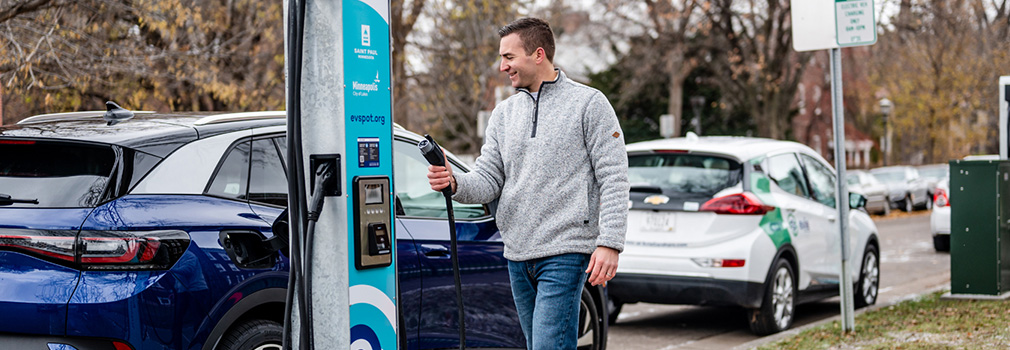Transportation vision: Power all vehicles with carbon-free energy by 2050

Xcel Energy has announced a new transportation vision that drives toward providing the energy and infrastructure to run all vehicles in its service area on carbon-free electricity or other clean energy by 2050. Expanding upon the company’s existing 2030 electric vehicle (EV) vision supports its overall goal to become a net-zero energy provider by 2050. By enabling a zero-carbon transportation future, the company’s clean energy can also help customers save billions of dollars in fuel costs and deliver cleaner air for everyone.
“Xcel Energy is making incredible progress and has already reduced power sector carbon emissions by 50% since 2005,” said Bob Frenzel, chairman, president, and CEO of Xcel Energy. “As we expand our clean energy leadership to transportation, which is the largest emitter of greenhouse gases in the nation, we know that electric vehicles are a key component of our comprehensive strategy to be a net-zero energy provider by 2050.”
Xcel Energy’s zero-carbon transportation vision for 2050 includes:
- Providing the energy system and fueling infrastructure to run all vehicles in its service area on carbon-free electricity or other clean energy.
- Ensuring all customers can access affordable EV charging at or within one mile of their homes and ensuring that underserved communities have opportunities to participate in Xcel Energy programs and the economic development benefits associated with zero-carbon transportation.
- Operating a zero-carbon Xcel Energy fleet.
To help make its clean transportation vision a reality, Xcel Energy will continue expanding programs, including those that make charging EVs at home, at work and on the go convenient and affordable for all customers. Its transportation vision supports everyone in the communities it serves to experience the benefits of electric transportation, whether they own an EV, use public transit or benefit from improved air quality.
With Xcel Energy increasing the amount of renewable and carbon-free energy on its system, an electric vehicle powered with Xcel Energy electricity in 2021 was more than 55% cleaner than a conventional gasoline-powered vehicle, and is expected to be at least 80% cleaner by 2030 under its plans for continuing to reduce carbon emissions. Lower cost is another key benefit as charging an EV during off-peak rate periods currently costs the equivalent of about $1 per gallon of gasoline or less, saving customers $1 billion annually on fuel by 2030.
To continue its drive toward this clean transportation future, the company has filed proposals in Minnesota and Wisconsin for new and enhanced EV charging programs to make charging at home fast, easy and more affordable for all customers. The proposals also include expanded solutions supporting public charging, businesses, multifamily buildings, community charging, and electric transit and school buses.
Together, the proposals would significantly increase the number of public EV charging stations, making it easier for drivers to charge on the go by adding about 750 high-speed charging stations across the two states, including up to about 1,500 total charging ports by 2026.
The proposals also enhance the company’s successful EV Accelerate at Home program, which provides a turnkey option via local electricians to install a home charger to better meet customers’ needs. It also expands programs and charger options to help businesses provide EV charging for employees, renters, fleet vehicles and the public.
These proposals are in addition to existing offers in other states Xcel Energy serves that support the vision. In 2021, the company launched a record 14 new clean-transportation programs in Colorado and Minnesota, and this year, it rolled out a suite of new EV programs for customers in New Mexico. Plus, the new programs are in addition to those already offered to customers in Minnesota and Wisconsin.
In Minnesota, an electric school bus pilot is also proposed as part of the company’s partnerships, research and innovation initiative. Through the school bus pilot, Xcel Energy will help address the significant upfront cost and operational challenges of transitioning to electric buses, and work to better understand how these buses can most efficiently support and integrate into the electric grid, among other research objectives. Pending regulatory approval, the 32 buses will be used in a vehicle-to-grid demonstration project to help maximize the benefits of electric buses to schools and to the electric grid.
Xcel Energy was the first in the industry to set ambitious greenhouse gas goals across all of the ways its customers use energy – electricity, heating and transportation. This new EV vision complements the company’s interim goal of enabling one out of five vehicles in the areas it serves to be electric by 2030, which was announced in August 2020. Under its 2050 vision, all vehicles would run on zero-carbon fuel, which may be electricity or other clean energy like carbon-free hydrogen.
For more information on EVs and available programs, please visit https://co.my.xcelenergy.com/s/our-commitment/ev-vision


